【2015中考复习方案】(外研·全国)2015届九年级英语复习课件:语法互动八 系动词和情态动词(共17张PPT)
文档属性
| 名称 | 【2015中考复习方案】(外研·全国)2015届九年级英语复习课件:语法互动八 系动词和情态动词(共17张PPT) |
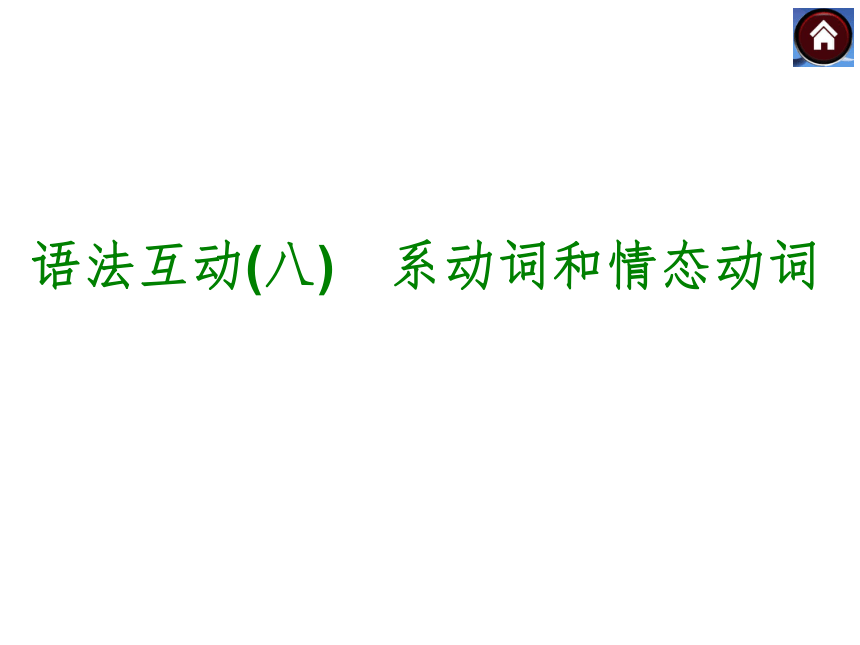
|
|
| 格式 | zip | ||
| 文件大小 | 168.2KB | ||
| 资源类型 | 教案 | ||
| 版本资源 | 外研版 | ||
| 科目 | 英语 | ||
| 更新时间 | 2015-01-07 08:59:11 | ||
图片预览

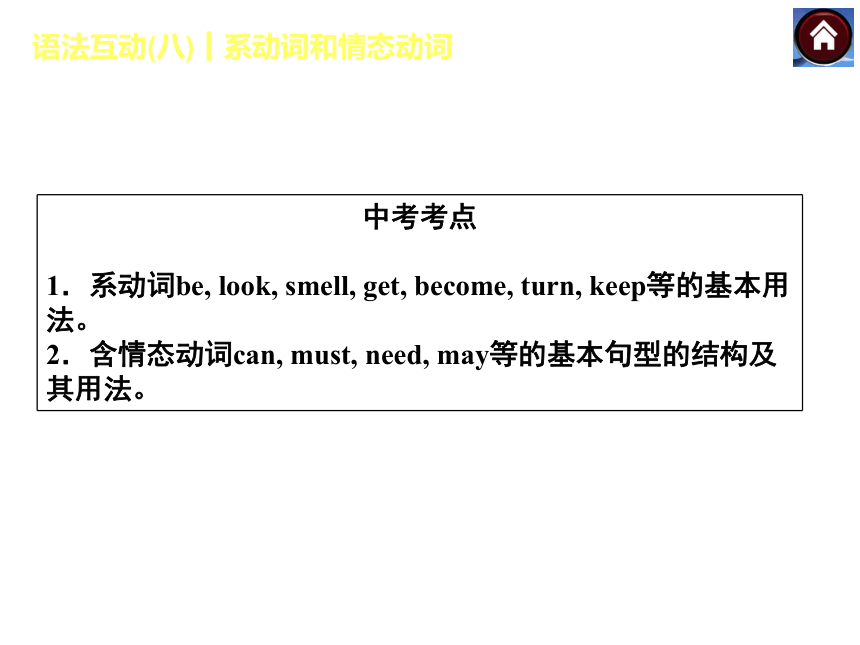
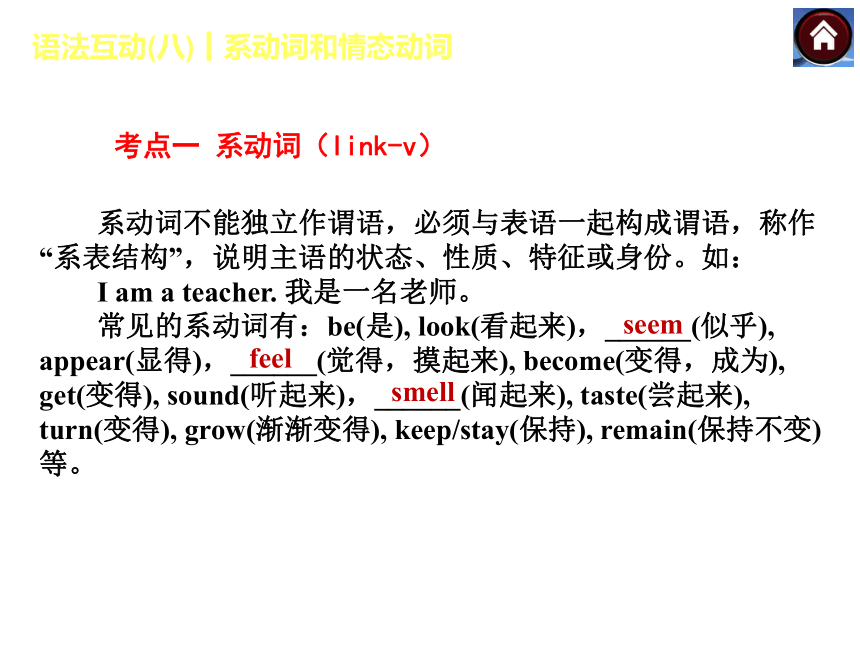
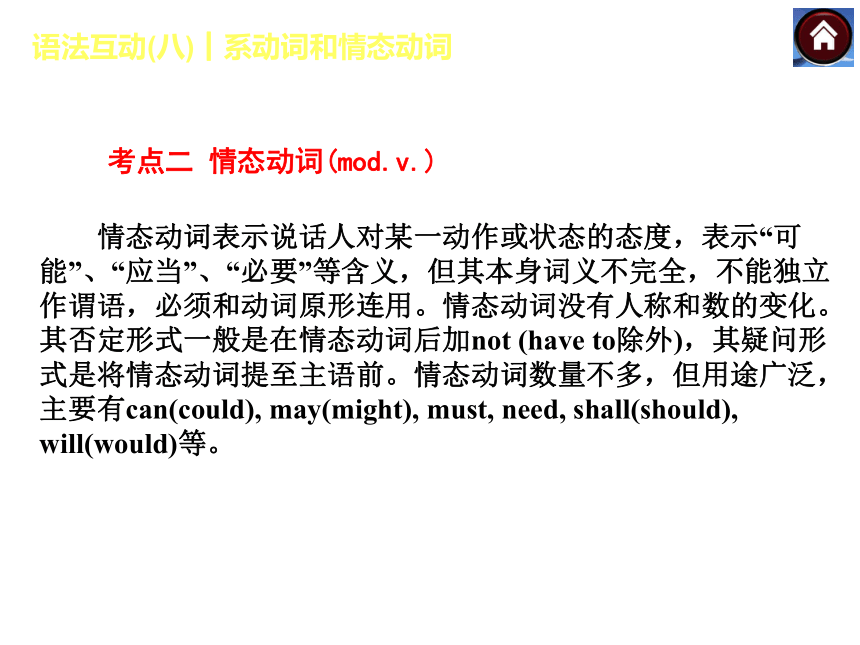
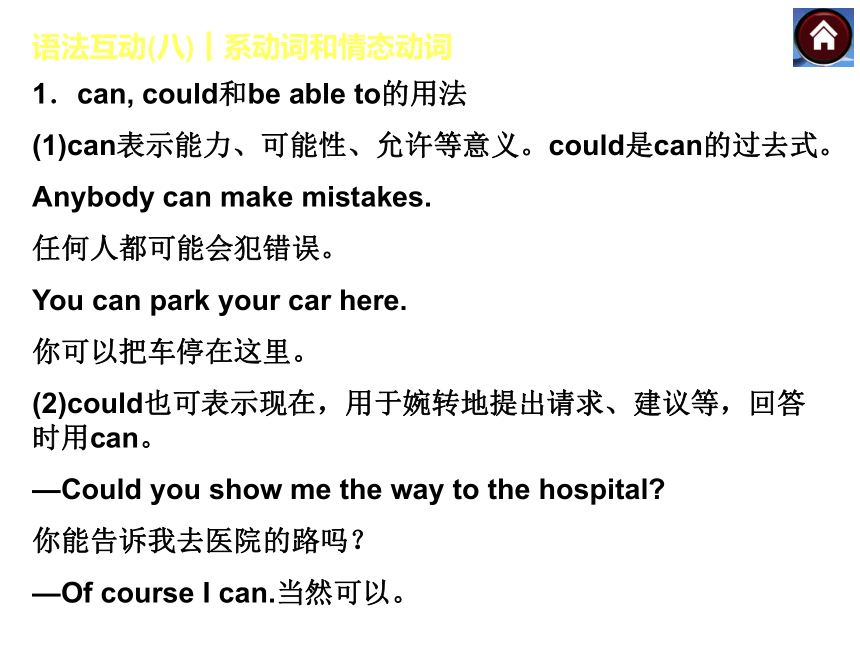
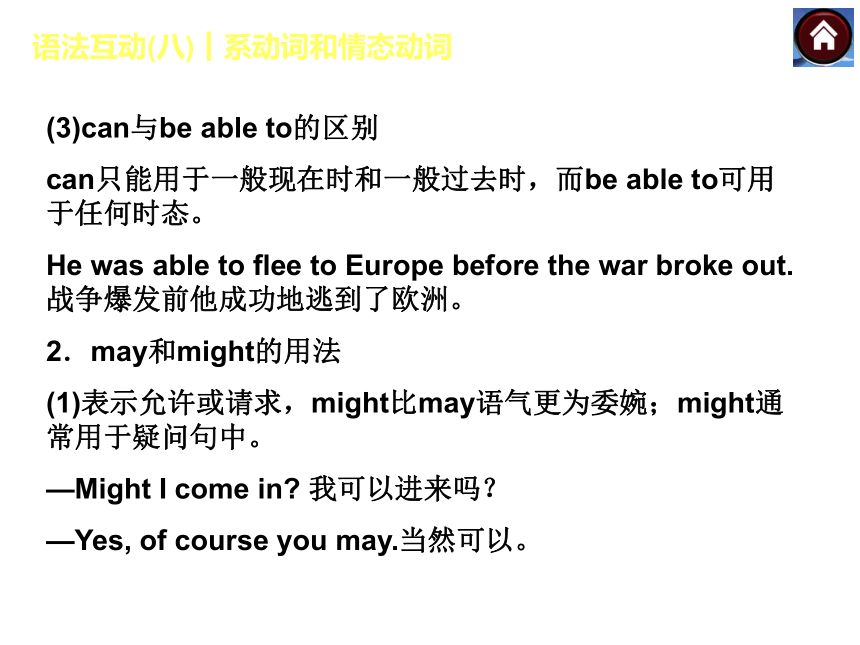
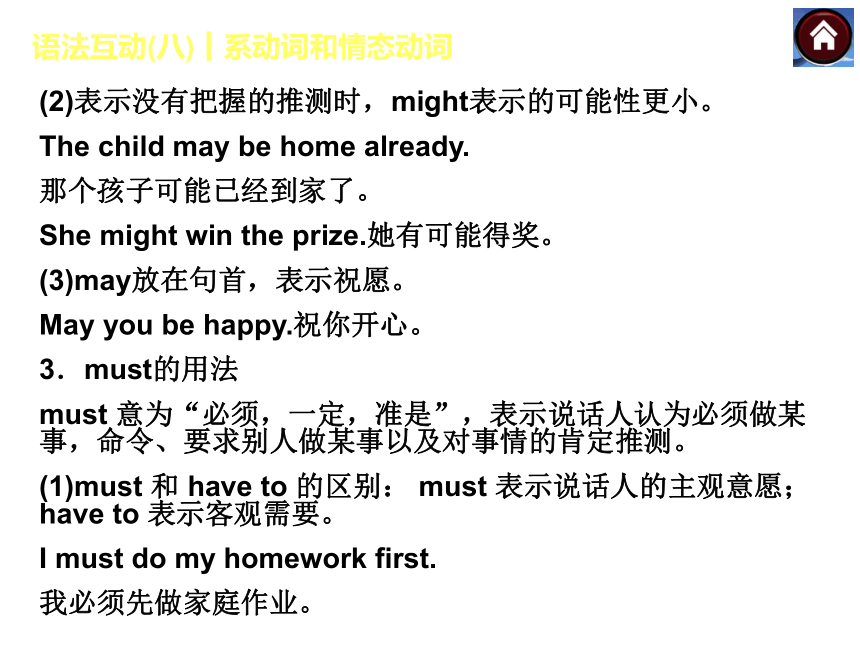
文档简介
课件17张PPT。语法互动(八) 系动词和情态动词语法互动(八)┃系动词和情态动词 系动词不能独立作谓语,必须与表语一起构成谓语,称作“系表结构”,说明主语的状态、性质、特征或身份。如:
I am a teacher. 我是一名老师。
常见的系动词有:be(是), look(看起来),______(似乎), appear(显得),______(觉得,摸起来), become(变得,成为), get(变得), sound(听起来),______(闻起来), taste(尝起来), turn(变得), grow(渐渐变得), keep/stay(保持), remain(保持不变)等。 seemfeelsmell语法互动(八)┃系动词和情态动词考点一 系动词(link-v) 情态动词表示说话人对某一动作或状态的态度,表示“可能”、“应当”、“必要”等含义,但其本身词义不完全,不能独立作谓语,必须和动词原形连用。情态动词没有人称和数的变化。其否定形式一般是在情态动词后加not (have to除外),其疑问形式是将情态动词提至主语前。情态动词数量不多,但用途广泛,主要有can(could), may(might), must, need, shall(should), will(would)等。语法互动(八)┃系动词和情态动词考点二 情态动词(mod.v.) 1.can, could和be able to的用法
(1)can表示能力、可能性、允许等意义。could是can的过去式。
Anybody can make mistakes.
任何人都可能会犯错误。
You can park your car here.
你可以把车停在这里。
(2)could也可表示现在,用于婉转地提出请求、建议等,回答时用can。
—Could you show me the way to the hospital?
你能告诉我去医院的路吗?
—Of course I can.当然可以。语法互动(八)┃系动词和情态动词(3)can与be able to的区别
can只能用于一般现在时和一般过去时,而be able to可用于任何时态。
He was able to flee to Europe before the war broke out. 战争爆发前他成功地逃到了欧洲。
2.may和might的用法
(1)表示允许或请求,might比may语气更为委婉;might通常用于疑问句中。
—Might I come in? 我可以进来吗?
—Yes, of course you may.当然可以。
语法互动(八)┃系动词和情态动词(2)表示没有把握的推测时,might表示的可能性更小。
The child may be home already.
那个孩子可能已经到家了。
She might win the prize.她有可能得奖。
(3)may放在句首,表示祝愿。
May you be happy.祝你开心。
3.must的用法
must 意为“必须,一定,准是”,表示说话人认为必须做某事,命令、要求别人做某事以及对事情的肯定推测。
(1)must 和 have to 的区别: must 表示说话人的主观意愿;have to 表示客观需要。
I must do my homework first.
我必须先做家庭作业。语法互动(八)┃系动词和情态动词It is raining hard outside; I ______ stay at home.
外面雨下得很大,我不得不待在家里。
(2)回答must提问的答语
①肯定回答:Yes,…must.
—Must I go home now?我必须现在回家吗?
—Yes, you must. 是的,你必须回家。
②否定回答:No,…needn't./No,…don't/doesn't have to.
—Must I go home now? 我必须现在回家吗?
—No, you ________________. 不,不必。have to语法互动(八)┃系动词和情态动词needn't/don't have to4.need的用法
(1)need 表示“需要”,主要用于否定句和疑问句中。其否定形式为needn't,表示“没有必要,不必”;用need 提问时,肯定回答用must,否定回答用 needn't。
—Need we do some cleaning now?
我们需要现在大扫除吗?
—Yes, you must. 是的,你们必须。
—No, you needn't. 不,你们不必。
(2)need 还可当作实义动词使用,常用于“need to do sth.”结构。
I need to learn more. 我需要学习更多。语法互动(八)┃系动词和情态动词5.shall和should的用法
shall 用于第一人称的句子中,表示提建议或请求; should用于各种人称的句子中,强调义务或责任。
______ we go out for a walk?
我们出去散步好吗?(建议)
You should study hard at school.
你们在学校应该努力学习。(劝告)Shall语法互动(八)┃系动词和情态动词6.will和would的用法
will用于第二人称的疑问句时,表示征求意见或提建议。would 为 will 的过去式,可用于多种人称,表示意愿。
Will you have a little soup? 你要不要喝点汤?
7.归纳:情态动词表推测的用法
(1)肯定句中一般用must(一定),may(可能),might/could(也许,或许),其中must表推测的语气最强,其余依次减弱。
The book must be hers. Her name is on it.
这本书一定是她的,她的名字在上面。
He must be running.他一定在跑步。
语法互动(八)┃系动词和情态动词They may know the way to the library.
他们可能知道去图书馆的路。
(2)否定句中一般用can't/couldn't(不可能)。
That man can't be Mr. Li, because he has gone to London.那个人不可能是李老师,因为他去伦敦了。
(3)疑问句中用can/could(能)。
—Can the red sweater be Tom's? 这件红毛衣会是汤姆的吗?
—No, it can't. He can't stand red.
不,不可能。他不能忍受红色。
[注意] 在表示婉转地提出请求、想法、建议等或用于疑问及否定句表示惊讶、不相信等时,might,could不是may,can的过去式。语法互动(八)┃系动词和情态动词Ⅰ.根据汉语提示完成句子
1.She ________________ (感到开心) when she saw her grandparents yesterday.
2.—Must I finish the work now?
—No, you ________________ (不必).
3.I think you ________________ (一定饿了). I'll cook dinner for you.
4.—Peter, is the dictionary Mary's?
—No, it ________________ (不可能是她的). Her dictionary is at home.
5.—Could I have a look at your photos?
—Yes, you ________ (能).语法互动(八)┃系动词和情态动词felt happy needn't/don't have tomust be hungrycan't be herscanⅡ.单项填空
1.Oh, it ________ so nice.What beautiful music it is!
A.smells B.sounds
C.tastes D.looks
2.I really enjoy the noodles and vegetables.They ________ delicious.
A.stay B.Feel C.taste D.sound
3.—Where are you going this month?
—We________ go to Hangzhou, but we're not sure.
A.needn't B.must
C.might D.mustn't语法互动(八)┃系动词和情态动词B CC4.—May I go out for a while, Mom?
—No, you________.You have to finish your homework first.
A.shouldn't B.needn't C.can't D.won't
5.Students in our school ________ know shouting is not allowed in the library.
A.can B.May C.must D.need
6.The woman who is talking with Mr.Brown ________ be Miss Li.She has gone to England.
A.can't B.Must C.may D.mustn't
语法互动(八)┃系动词和情态动词C CA7.—Can I borrow your ruler, please?
—Yes, you________.But you must return it to me before lunchtime.
A.have to B.can
C.must D.could
8.—Dad, must we wait until the light becomes green?
—Yes, I'm afraid we________ .That's the traffic rule.
A.can B.may
C.have to D.need
语法互动(八)┃系动词和情态动词B C9.________I see your ID card, sir? We have to check your information.
A.May B.Must
C.Should D.Need
10.Finish your homework first, then you'll ________ watch TV for an hour.
A.can B.be able to
C.able D.could语法互动(八)┃系动词和情态动词AB
I am a teacher. 我是一名老师。
常见的系动词有:be(是), look(看起来),______(似乎), appear(显得),______(觉得,摸起来), become(变得,成为), get(变得), sound(听起来),______(闻起来), taste(尝起来), turn(变得), grow(渐渐变得), keep/stay(保持), remain(保持不变)等。 seemfeelsmell语法互动(八)┃系动词和情态动词考点一 系动词(link-v) 情态动词表示说话人对某一动作或状态的态度,表示“可能”、“应当”、“必要”等含义,但其本身词义不完全,不能独立作谓语,必须和动词原形连用。情态动词没有人称和数的变化。其否定形式一般是在情态动词后加not (have to除外),其疑问形式是将情态动词提至主语前。情态动词数量不多,但用途广泛,主要有can(could), may(might), must, need, shall(should), will(would)等。语法互动(八)┃系动词和情态动词考点二 情态动词(mod.v.) 1.can, could和be able to的用法
(1)can表示能力、可能性、允许等意义。could是can的过去式。
Anybody can make mistakes.
任何人都可能会犯错误。
You can park your car here.
你可以把车停在这里。
(2)could也可表示现在,用于婉转地提出请求、建议等,回答时用can。
—Could you show me the way to the hospital?
你能告诉我去医院的路吗?
—Of course I can.当然可以。语法互动(八)┃系动词和情态动词(3)can与be able to的区别
can只能用于一般现在时和一般过去时,而be able to可用于任何时态。
He was able to flee to Europe before the war broke out. 战争爆发前他成功地逃到了欧洲。
2.may和might的用法
(1)表示允许或请求,might比may语气更为委婉;might通常用于疑问句中。
—Might I come in? 我可以进来吗?
—Yes, of course you may.当然可以。
语法互动(八)┃系动词和情态动词(2)表示没有把握的推测时,might表示的可能性更小。
The child may be home already.
那个孩子可能已经到家了。
She might win the prize.她有可能得奖。
(3)may放在句首,表示祝愿。
May you be happy.祝你开心。
3.must的用法
must 意为“必须,一定,准是”,表示说话人认为必须做某事,命令、要求别人做某事以及对事情的肯定推测。
(1)must 和 have to 的区别: must 表示说话人的主观意愿;have to 表示客观需要。
I must do my homework first.
我必须先做家庭作业。语法互动(八)┃系动词和情态动词It is raining hard outside; I ______ stay at home.
外面雨下得很大,我不得不待在家里。
(2)回答must提问的答语
①肯定回答:Yes,…must.
—Must I go home now?我必须现在回家吗?
—Yes, you must. 是的,你必须回家。
②否定回答:No,…needn't./No,…don't/doesn't have to.
—Must I go home now? 我必须现在回家吗?
—No, you ________________. 不,不必。have to语法互动(八)┃系动词和情态动词needn't/don't have to4.need的用法
(1)need 表示“需要”,主要用于否定句和疑问句中。其否定形式为needn't,表示“没有必要,不必”;用need 提问时,肯定回答用must,否定回答用 needn't。
—Need we do some cleaning now?
我们需要现在大扫除吗?
—Yes, you must. 是的,你们必须。
—No, you needn't. 不,你们不必。
(2)need 还可当作实义动词使用,常用于“need to do sth.”结构。
I need to learn more. 我需要学习更多。语法互动(八)┃系动词和情态动词5.shall和should的用法
shall 用于第一人称的句子中,表示提建议或请求; should用于各种人称的句子中,强调义务或责任。
______ we go out for a walk?
我们出去散步好吗?(建议)
You should study hard at school.
你们在学校应该努力学习。(劝告)Shall语法互动(八)┃系动词和情态动词6.will和would的用法
will用于第二人称的疑问句时,表示征求意见或提建议。would 为 will 的过去式,可用于多种人称,表示意愿。
Will you have a little soup? 你要不要喝点汤?
7.归纳:情态动词表推测的用法
(1)肯定句中一般用must(一定),may(可能),might/could(也许,或许),其中must表推测的语气最强,其余依次减弱。
The book must be hers. Her name is on it.
这本书一定是她的,她的名字在上面。
He must be running.他一定在跑步。
语法互动(八)┃系动词和情态动词They may know the way to the library.
他们可能知道去图书馆的路。
(2)否定句中一般用can't/couldn't(不可能)。
That man can't be Mr. Li, because he has gone to London.那个人不可能是李老师,因为他去伦敦了。
(3)疑问句中用can/could(能)。
—Can the red sweater be Tom's? 这件红毛衣会是汤姆的吗?
—No, it can't. He can't stand red.
不,不可能。他不能忍受红色。
[注意] 在表示婉转地提出请求、想法、建议等或用于疑问及否定句表示惊讶、不相信等时,might,could不是may,can的过去式。语法互动(八)┃系动词和情态动词Ⅰ.根据汉语提示完成句子
1.She ________________ (感到开心) when she saw her grandparents yesterday.
2.—Must I finish the work now?
—No, you ________________ (不必).
3.I think you ________________ (一定饿了). I'll cook dinner for you.
4.—Peter, is the dictionary Mary's?
—No, it ________________ (不可能是她的). Her dictionary is at home.
5.—Could I have a look at your photos?
—Yes, you ________ (能).语法互动(八)┃系动词和情态动词felt happy needn't/don't have tomust be hungrycan't be herscanⅡ.单项填空
1.Oh, it ________ so nice.What beautiful music it is!
A.smells B.sounds
C.tastes D.looks
2.I really enjoy the noodles and vegetables.They ________ delicious.
A.stay B.Feel C.taste D.sound
3.—Where are you going this month?
—We________ go to Hangzhou, but we're not sure.
A.needn't B.must
C.might D.mustn't语法互动(八)┃系动词和情态动词B CC4.—May I go out for a while, Mom?
—No, you________.You have to finish your homework first.
A.shouldn't B.needn't C.can't D.won't
5.Students in our school ________ know shouting is not allowed in the library.
A.can B.May C.must D.need
6.The woman who is talking with Mr.Brown ________ be Miss Li.She has gone to England.
A.can't B.Must C.may D.mustn't
语法互动(八)┃系动词和情态动词C CA7.—Can I borrow your ruler, please?
—Yes, you________.But you must return it to me before lunchtime.
A.have to B.can
C.must D.could
8.—Dad, must we wait until the light becomes green?
—Yes, I'm afraid we________ .That's the traffic rule.
A.can B.may
C.have to D.need
语法互动(八)┃系动词和情态动词B C9.________I see your ID card, sir? We have to check your information.
A.May B.Must
C.Should D.Need
10.Finish your homework first, then you'll ________ watch TV for an hour.
A.can B.be able to
C.able D.could语法互动(八)┃系动词和情态动词AB
同课章节目录
- 词法
- 名词
- 动词和动词短语
- 动词语态
- 动词时态
- 助动词和情态动词
- 非谓语动词
- 冠词
- 代词
- 数词和量词
- 形容词副词及其比较等级
- 介词和介词短语
- 连词和感叹词
- 构词法
- 相似、相近词比较
- 句法
- 陈述句
- 一般疑问句和否定疑问句
- 特殊疑问句及选择疑问句
- 反意疑问句
- 存在句(There be句型)
- 宾语从句
- 定语从句
- 状语从句
- 主谓一致问题
- 简单句
- 并列句
- 复合句
- 主谓一致
- 主、表语从句
- 名词性从句
- 直接引语和间接引语
- 虚拟语气
- 感叹句
- 强调句
- 倒装句
- 祈使句
- 句子的成分
- 句子的分类
- 题型专区
- 单项选择部分
- 易错题
- 完形填空
- 阅读理解
- 词汇练习
- 听说训练
- 句型转换
- 补全对话
- 短文改错
- 翻译
- 书面表达
- 任务型阅读
- 语法填空
- 其他资料
